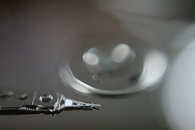Tuesday, February 7th 2012
Heat Key To Faster HDDs...Hundreds of Times Faster
Physicists have discovered a new method of recording data on hard drives that could potentially make mechanical hard drives hundreds of times faster (in terms of performance). Heat holds the key. A hard disk drive is a magnetic storage device, which, unlike magnetic tapes, allows random access. Its recording surfaces consist of hundreds of billions of tiny portions that can be magnetized in a particular polar direction to represent 0s or 1s. To create meaningful arrangements of these portions (bytes), the recording heads apply an external magnetic field to flip their polarities.
A team of researchers led by Thomas Ostler at the University of York, UK concluded that the process of flipping the polarities of these tiny portions can be greatly expedited using short bursts of heat. It has been believed that heat could only assist in remagnetization, when used in conjunction with a magnetic field. Research shows that this can also be achieved using a very, very precise amount of heat generated by beaming a fine laser for less than a trillionth of a second, which momentarily raises its temperature by 800 °C. The results of this study was published here.Researchers say that the new method of magnetic recording can achieve terabytes per second (1000 GB/s) recording/reading speeds. The process also uses less energy than magnetic recording, meaning the new drives would be more energy efficient.
Sources:
New Scientist, Gizmodo
A team of researchers led by Thomas Ostler at the University of York, UK concluded that the process of flipping the polarities of these tiny portions can be greatly expedited using short bursts of heat. It has been believed that heat could only assist in remagnetization, when used in conjunction with a magnetic field. Research shows that this can also be achieved using a very, very precise amount of heat generated by beaming a fine laser for less than a trillionth of a second, which momentarily raises its temperature by 800 °C. The results of this study was published here.Researchers say that the new method of magnetic recording can achieve terabytes per second (1000 GB/s) recording/reading speeds. The process also uses less energy than magnetic recording, meaning the new drives would be more energy efficient.

42 Comments on Heat Key To Faster HDDs...Hundreds of Times Faster
Grant money hunt anyone?
And very interesting development for hard disc tech.
Hurray for the University of York!
Sounds cool(no pun intended) If this get popular than hopefully it will drive prices of more practical stuff down. As it will take a long time to be able transfer stuff at those speeds.
And for the energy use this would be helpful for large servers with TB's of memory. Take a server with over 120TB's say they all are 2TB thats 60HD's that can create a lot of heat and power.
aka PCIe 3.0 x1 = 2GB/s
You could have shark's with red/green or blue/purple or any combination lol
Every indication would leave one to believe that mechanical drives are going the way of the dinosaur.
What about Capacity per GB expense?
Temperatures of 800c inside a component as small as an HDD sounds like a fire risk. Also with that heat im guessing there would be a lot of wear & tear.
Here's my question, even if the laser only has to beam for a trillionth of a second, and say i'm transfering a massive amount of data(take the server example above) of 120TB, wouldn't the constant beaming cause instability, bc the drive would eventually heat up too much. I suppose that's the only thing holding this back.
Additionally, as was mentioned above, this doesn't appear to help with read times at all.
Edit: Forgot to mention, this isn't going to help seek times either unless they speed up the RPM's.
Better seek times, more speed :D
What's the cool down time for the spot the laser hits and cooks to 800°C?
If adjacent heat transfer occurs between laser points, the platter is going to have to be made out of ceramic (think space shuttle tiles) to perform sequential writes.